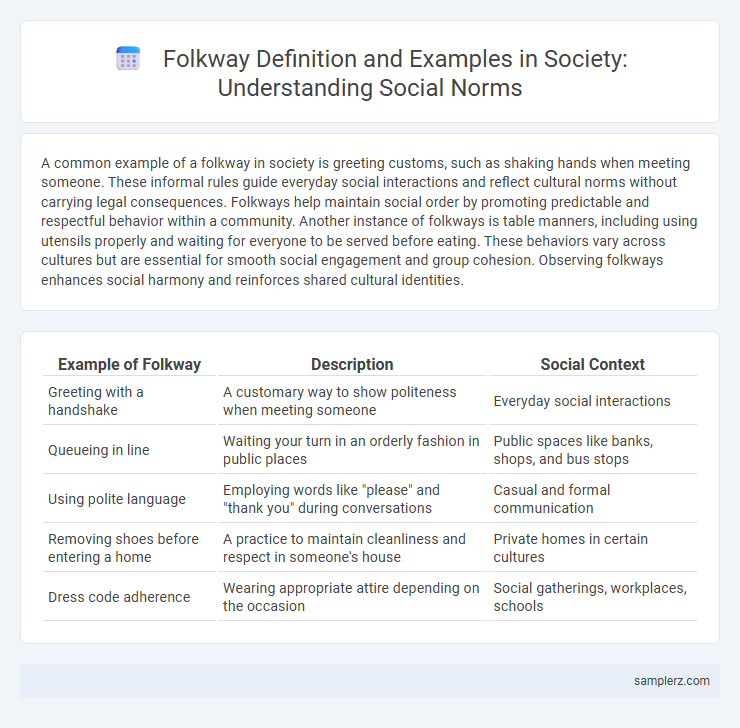A common example of a folkway in society is greeting customs, such as shaking hands when meeting someone. These informal rules guide everyday social interactions and reflect cultural norms without carrying legal consequences. Folkways help maintain social order by promoting predictable and respectful behavior within a community. Another instance of folkways is table manners, including using utensils properly and waiting for everyone to be served before eating. These behaviors vary across cultures but are essential for smooth social engagement and group cohesion. Observing folkways enhances social harmony and reinforces shared cultural identities.
Table of Comparison
| Example of Folkway | Description | Social Context |
|---|---|---|
| Greeting with a handshake | A customary way to show politeness when meeting someone | Everyday social interactions |
| Queueing in line | Waiting your turn in an orderly fashion in public places | Public spaces like banks, shops, and bus stops |
| Using polite language | Employing words like "please" and "thank you" during conversations | Casual and formal communication |
| Removing shoes before entering a home | A practice to maintain cleanliness and respect in someone's house | Private homes in certain cultures |
| Dress code adherence | Wearing appropriate attire depending on the occasion | Social gatherings, workplaces, schools |
Understanding Folkways: Everyday Social Norms
Folkways are informal social norms that govern everyday behavior in society, such as greeting others with a handshake or saying "please" and "thank you." These practices help maintain social order by guiding routine interactions and promoting respect among individuals. Deviating from folkways rarely results in severe punishment but can lead to social disapproval or embarrassment.
Greeting Customs: Handshakes to Hellos
Greeting customs such as handshakes and verbal hellos serve as fundamental folkways that reinforce social cohesion and establish mutual respect within communities. These informal norms guide everyday interactions, signaling friendliness and recognition without explicit rules or enforcement. Variations in greeting practices reflect cultural values and social expectations, shaping first impressions and fostering interpersonal connections.
Dress Codes: What We Wear and Why
Dress codes serve as a clear example of folkways, guiding acceptable clothing choices based on cultural norms and social settings without strict legal enforcement. Wearing formal attire to a wedding or business suit in the office reflects societal expectations that influence daily interactions and identity expressions. Deviating from these dress codes may lead to social disapproval rather than legal consequences, highlighting the role of folkways in maintaining social order.
Table Manners: The Unspoken Rules of Dining
Table manners exemplify folkways by guiding acceptable behavior during meals, such as using utensils properly, chewing with a closed mouth, and waiting for everyone to be served before eating. These unwritten social norms promote respect and harmony within diverse cultural settings, reflecting communal values ingrained through generations. Observing these subtle conventions reinforces social cohesion without formal enforcement, distinguishing everyday etiquette from rigid laws.
Gift-Giving Etiquette in Different Cultures
Gift-giving etiquette varies widely across cultures, reflecting deep-rooted folkways that guide social interactions and relationships. In Japan, presenting gifts with both hands symbolizes respect and sincerity, while in India, offering gifts with the right hand is customary to honor cultural norms. Understanding these culturally specific practices enhances social harmony and demonstrates awareness of community values in diverse societies.
Queueing: The Social Art of Waiting in Line
Queueing exemplifies a folkway that governs everyday social behavior by promoting order and fairness in public spaces. This informal norm encourages individuals to wait patiently their turn, reflecting respect for others and collective cooperation. Observing queueing customs prevents chaos and facilitates smooth social interactions in diverse settings like banks, stores, or transportation hubs.
Conversation Politeness: Small Talk and Courtesy
Conversation politeness in society often manifests through small talk, such as commenting on the weather or asking about someone's well-being, which serves as a folkway that fosters social harmony. Courteous expressions like "please," "thank you," and "excuse me" are ingrained norms that regulate everyday interactions and signal respect. These subtle verbal habits help maintain positive social bonds and reflect underlying cultural expectations of friendliness and consideration.
Public Behavior: Volume and Personal Space
Speaking loudly in a library is a clear breach of social folkways, as it disrupts the quiet environment expected in public spaces. Maintaining appropriate personal space, such as standing a reasonable distance away in queues or elevators, prevents discomfort and respects social norms. These public behavior folkways facilitate smooth interpersonal interactions and uphold community standards.
Visiting Etiquette: Dos and Don’ts
Visiting etiquette as a folkway dictates specific behaviors such as removing shoes before entering a home and bringing a small gift for the host, promoting respect and goodwill. Guests are expected to avoid discussing controversial topics or staying too long, ensuring harmony and comfort within social interactions. These unwritten rules reinforce cultural norms and facilitate smooth, polite exchanges in social settings.
Celebrating Traditions: Festivals and Rituals
Festivals like Diwali in India and Thanksgiving in the United States exemplify folkways by fostering community bonds through unique rituals and customary practices. These celebrations typically involve specific foods, attire, and activities that are passed down generations, reflecting the cultural identity and values of the society. Observing these folkways during festive occasions reinforces social cohesion and preserves cultural heritage.

example of folkway in society Infographic
 samplerz.com
samplerz.com